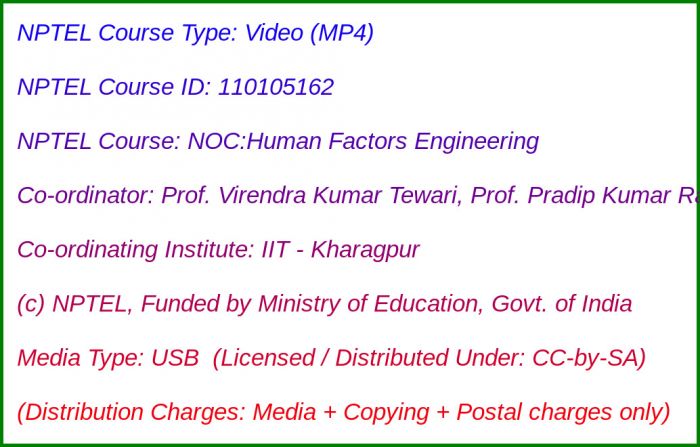
Media Storage Type : 32 GB USB Stick
NPTEL Subject Matter Expert : Prof. Virendra Kumar Tewari, Prof. Pradip Kumar Ray
NPTEL Co-ordinating Institute : IIT Kharagpur
NPTEL Lecture Count : 60
NPTEL Course Size : 8.3 GB
NPTEL PDF Text Transcription : Available and Included
NPTEL Subtitle Transcription : Available and Included (SRT)
Lecture Titles:
Lecture 1 - Definition, purpose, and development of Human Factors and Ergonomics
Lecture 2 - Types and components of worksystems, their interactions and evaluations
Lecture 3 - Human components, machine components and environment components of worksystems
Lecture 4 - Modern worksystems, FMJ vs FJM
Lecture 5 - Contribution of human factors in systems design, engineering and management
Lecture 6 - Anthropometry in product/process design, MHD, anthropometric design motto
Lecture 7 - Types of anthropometric data, principles of applied anthropometry
Lecture 8 - Examples of anthropometric design, numerical exercises
Lecture 9 - Working Posture Analysis, Postural Triangle, Design for Seated and Standing Workers - Part 1
Lecture 10 - Working Posture Analysis, Postural Triangle, Design for Seated and Standing Workers - Part 2
Lecture 11 - Metabolism during work, Aerobic and anaerobic work, oxygen uptake
Lecture 12 - Physical work capacity and energy expenditure, Individual differences, RWL, MOW
Lecture 13 - MOE expenditure, Subjective measures of physical effort, Borg RPE scale, Factors
Lecture 14 - EE of various operations in agriculture, construction and manufacturing industry - I
Lecture 15 - EE of various operations in agriculture, construction and manufacturing industry - II
Lecture 16 - Types of Injury Problems in Manual Handling Tasks, Types of Activities and Body Movements
Lecture 17 - Biomechanical Modelling and Analysis of Manual Lifting
Lecture 18 - Definitions and Standards of Lifting: NIOSH Lifting Equation
Lecture 19 - EC Guidelines, UK Health and Safety Commission Guidelines
Lecture 20 - Use of Material Handling Aids, Types of Material Handling Devices, Numerical Problems
Lecture 21 - Ergonomic Problems in Computer Workstations, Design Elements of Computer Workstation
Lecture 22 - Specifications of Computer Workstation Design Elements
Lecture 23 - Methods to Reduce Glare/Reflection on Screen
Lecture 24 - Design of Human-Computer Interaction
Lecture 25 - Evolution of Technology in Computer Screen, Numerical Problems
Lecture 26 - Work Postures and Related Complaints, Work Postures for Different Tasks, Task Analysis
Lecture 27 - Power Law of Practice, Learning Curve, Numerical Pro
Lecture 28 - Work Posture Assessment, Rapid Entire Body Assessment (REBA), MSDs/RMIs
Lecture 29 - Hand tool design: Fitting the task, user and hand, Usage of hand tools and types of
Lecture 30 - Design guidelines for hand tools
Lecture 31 - Environment Component in Worksystems, Ergonomic Design of Physical Environment
Lecture 32 - Ergonomic Design Framework for Environment, Importance of Illumination
Lecture 33 - Measurement of Illuminance, Luminance, and Contrast
Lecture 34 - Measures of Contrast, Contrast Ratio under Different Work Situations
Lecture 35 - Direct and Indirect Glare or Reflection, Illumination for Inspection and Quality
Lecture 36 - Problem of Heat Stress at Workplaces, Thermoregulation Process, Acclimation and
Lecture 37 - Thermal Balance Equation and Heat Stress
Lecture 38 - Quality of Thermal Environment, Evaluation of Thermal Environment
Lecture 39 - Whole Body Vibration and Sources of Vibration Discomfort
Lecture 40 - Design guidelines for hand tools
Lecture 41 - Auditory Environment and Human Performance, Measurement of Sound and Noise Exposure
Lecture 42 - Noise Exposure and Hearing Loss, Noise Analysis and Noise Reduction using Engineering
Lecture 43 - Effects of Noise on Performance, Broadbent and Poulton Theories, Interference of Noise
Lecture 44 - Octave bands and examples
Lecture 45 - Ergonomic design ofauditory environmentin different workplaces
Lecture 46 - Concepts of Design for Manufacturing (DFM), Design for Assembly (DHA), and Design
Lecture 47 - Product Design Assessment and Important Measures, Manual Assembly Design Efficiency
Lecture 48 - Assembly Time Determination with PMTS Methods, Human Factors Principles in DHA
Lecture 49 - Maintenance in Manufacturing/Production System - Important Ergonomic Design Issues - Part I
Lecture 50 - Maintenance in Manufacturing/Production System - Important Ergonomic Design Issues - Part II
Lecture 51 - Definition of Shift Work, Problems with Shift Work, Effect on Circadian Rhythms
Lecture 52 - Problems of shift workers, Shift Work and Human Performance
Lecture 53 - Recommended Shift Work Schedules
Lecture 54 - Major Ergonomic Issues and Problems in Shift Work Design - Part 1
Lecture 55 - Major Ergonomic Issues and Problems in Shift Work Design - Part 2
Lecture 56 - Concepts of Ergonomic Performance and its Indicators
Lecture 57 - EPI Assessment Tool Development
Lecture 58 - Factors and their level of assessment
Lecture 59 - Application of EPI Model in Different Worksystems
Lecture 60 - Epilogue

